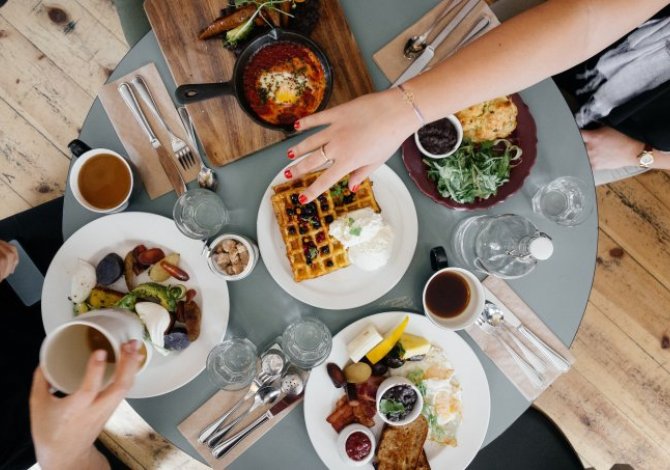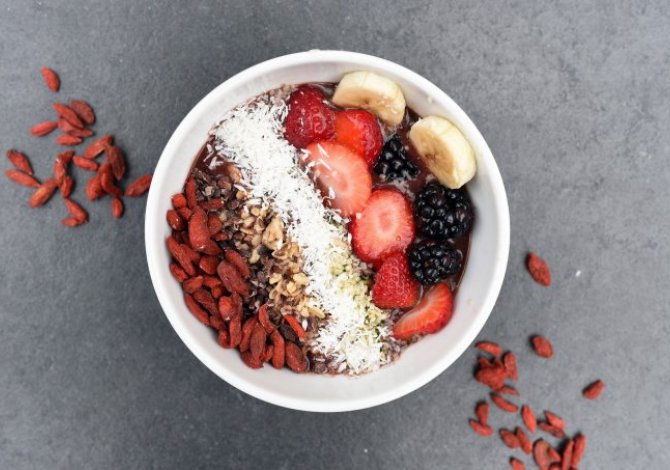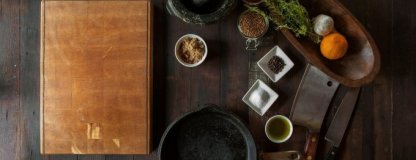1. buy an instant digital meat thermometer.
The quickest way to ruin a perfectly marbled $25 steak? Cut it to find out if it's medium rare. Yes, the Thermapen costs $95, but four steaks later, you broke even.
2 Write in your cookbooks.
The soup could have used more tomatoes? The chicken needed ten more minutes in the oven? Make a note of it, and you'll never make that mistake again.
3 - Master quick pickling.
Whisk some salt and sugar into the white vinegar. Pour in thinly sliced raw vegetables. Wait 20 minutes. Eat.
4. Have your knives professionally sharpened.
You may have a steel or sharpener at home, but once a year get a professional to revive those knives. Your chopping will be faster, more accurate and, believe it or not, safer.
5 Four words to live by: family package with chicken thighs.
Chicken breasts are expensive and can get boring after a while; thighs are juicier, cheaper and more flavorful.
6. Ditch most of your spices - especially that ground cumin.
Ground spices die quickly. So give them a whiff - if they don't smell, they won't taste like anything. And if they don't taste like anything, you're cooking with a flavorless brown powder.
7 - Join a CSA.
At the very least, you'll learn how to cook kale fifteen ways. You'll maximize your culinary horizons by finding ways to use all that fresh produce.
8 - Replace your non-stick skillet.
Do your scrambled eggs slide off the pan if you don't use oil or butter? They should. It may be time for an upgrade.
9. treat your herbs like flowers.
There's nothing worse than limp herbs. Next time, trim the stems and put the parsley in a glass of water, put a plastic bag over it and store it in the fridge.
10 - Get a mandoline and don't be afraid to use it.
Want great scalloped potatoes or scrambled carrots? Buy a mandoline. Are you a scarecrow? Wear a cut-resistant protective glove until you feel like you have bare hands.
11. double batch of rice (or quinoa, or bulgar, or...).
Cooked grains in the fridge mean that fried rice, pilaf, rice bowls and solid salads are all within reach.
12 - Make sure your workspace is well lit.
Look, the 40-watt bulb in your oven hood won't cut it. Get a cheap clamp light from the hardware store so you can see what you're doing.
13. buy parchment paper.
What else are you going to roast your vegetables on? How else are you going to make a quick dinner of fish inparchment paper?
14. stock up on super-cheap, random cuts of meat.
A freezer full of roasted turkey necks and chunks of beef off the bone will ensure you always have what you need to make broth.
15 - Save your parmesan rinds and freeze them for later.
Remember that thing with the chunks of meat in a super heap? Think of the rinds as bones of cheese.
16 - Buy a new kitchen sponge.
Existential Question Time. If your sponge is dirty and smells, how can you expect it to clean dishes?
17 Put a lid on your pot to make the water boil faster.
It seems obvious, but if you didn't know, you know now.
18. dry your salad greens with a kitchen towel.
Salad spinners? So bulky and annoying. Instead, put your freshly washed greens in a clean towel, gather them at the ends, and wave that sucker around until the salad dries (or your arm gets tired).
19 - Save the schmaltz.
Chicken fat is an amazing thing, whether you're frying onions in it, sauteing greens in it, or spreading it on toast. So after you've eaten your roast chicken dinner, drain the now-cooled liquid fat into a plastic container and store it in the freezer. (Pro tip: This also applies to bacon fat).
20 Use a garbage bowl.
Hat tip to Rachael Ray. Buy a large bowl and keep it ready to fill with eggshells and other garbage created during cooking.
21 - Buy a new Y peeler.
Like anecdotes about high school football games, peelers get dull, especially after a few years. We recommend the Kuhn Rikon Swiss Peeler, which only costs seven bucks.
22 - Find the biggest mixing bowl you can and buy it.
You can't toss salad, stir cookies, or make meatballs in a tiny cereal bowl. All you can do is make a bigger mess.
23 - Avoid bad glass cutting boards.
And they're all bad. Glass cutting boards send chills down your spine when you use them. They dull your knives. They're slippery. And they're hard to use. Use wood, bamboo or plastic instead.
24 - Buy two loaves of this wonderful bread and freeze one.
Bread keeps really well in the freezer. And there are always many ways to do this. Just remember: Air is the enemy! Wrap that loaf in plastic wrap (sliced or not) and put it in a freezer bag before storing.
25 - Stop crowding your pans.
Food that's crowded into a cast iron skillet or tin tray becomes steamed - and soggy - instead of crispy.
26 Toast the spices...
A quick stint in a dry skillet over medium heat wakes up the dry spices and releases their oils, which means your peppers will taste much more pepper-y. Use whole spices, watch the pan like a hawk and stir constantly until the spices are fragrant, then transfer to a plate to cool before using.
27 - ... and your nuts.
"These nuts are too crunchy," said no one ever.
28. ...And your grains.
That's the first step to building a tasty, warm flavor. (Using quinoa? Toast before rinsing.)
29. season (some) of your vegetables with sugar.
Carrots, squash, tomatoes - these veggies have a natural sweetness that is enhanced by a little (just a little!) sugar.
30 - Don't be afraid to set off the fire alarm.
Especially when cooking meat. Smoke equals char, and char is delicious.
31. Put damp paper or a kitchen towel under your cutting board.
That way, your board won't slip while chopping.
32.When the recipe calls for chocolate chips, break the chocolate bar instead.
Chopping your own chips creates pockets of melted chocolate through your cookies - some small, some large, all delicious.
33 - Salt your salads.
It adds texture. It makes the dressing pop. It proves that there's nothing you shouldn't salt.
34. Chill your food before putting it in the refrigerator or freezer.
If you don't, the temperature in the fridge will rise. And the only benefit is mold.
35. don't toast. Fry it.
Heat some butter or olive oil over medium heat. Lay in the bread and fry until golden brown on both sides. Sell your toaster.
36 - Buy your avocados at a Mexican grocery store.
These are the stores that sell them ripe.
37. always keep your lemons in the refrigerator.
They'll keep longer that way, so you can always add fresh lemon juice to everything from dressings to smoothies. Plus, you can use the squeezed rinds to clean and deodorize your cutting boards.
38 - Caramelize more onions than you need.
Lots more - you'll use the extras in omelets and sandwiches; on chicken, steak and pork; in pastas and stews.
39 Take the Microplane.
Having trouble shredding cubes instead of cheese? Buy a Microplane, which will provide years of shredding for about $15.
40. Switch to metal measuring cups and spoons.
Plastic warps become less precise over time.
41. Store salad greens in a resealable plastic bag with a paper towel.
The towel is designed to absorb moisture, keeping the greens crunchy longer.
42 - Find (and buy) professional grade kitchen towels.
Oh, look, we just found them for you.
43 - Soften your butter...
Serving it cold and hard on toast - that's the only way to ruin butter. (Need to be soft in a hurry? Here are four ways.)
44: ...and stir something into it.
Some shallots, some chopped herbs, maybe some lemon zest. You just made compound butter.
45. microfiber dish drying mats are better than dish racks.
So is a decent dish towel. Who has room for a dish rack?
46 - Buy brown sugar as you need it, in the smallest amount possible.
The stuff just doesn't keep very long.
47) But if your brown sugar is rock hard, don't throw it away.
Recover it with a minute or more in the microwave.
48. get a bowl of salt.
Having a sachet of salt always within reach when you're at the stove is the first step to better seasoning (see tip 57).
49. bake cakes in glass pans.
They heat more evenly than a tin, and when your cakes are perfectly golden brown everywhere, you'll know it.
50: Oil, salt, roast in this order.
While the vegetables are roasting, toss them in the oil, then season with salt and pepper and toss again. This way the seasoning will stick to your food.
















Comments (0)